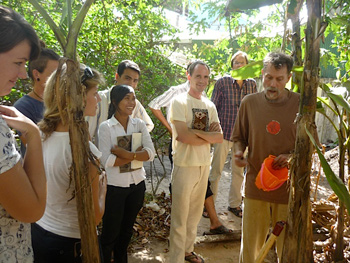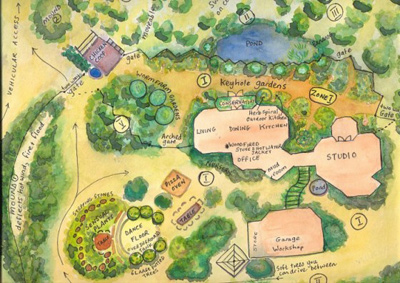 Koh Phangan has been a popular tourist destination for partying and letting loose for a long time, but it is much more than that.
Koh Phangan has been a popular tourist destination for partying and letting loose for a long time, but it is much more than that.
With its proximity to world class diving, beautiful mountains, pristine rainforest preserves, waterfalls, hiking trails, kayaking, and exceptional health food restaurants, Koh Phangan is quickly becoming a destination for eco-tourism around Thailand.
With this new wave of clientele, Koh Phangan is also having a resurgence of local and organic food production, and ecologically-minded groups working to clean-and-green the island.
When listening to conversations around the island, it is becoming more and more frequent to hear the word Permaculture being mentioned, from courses on the topic to local projects which are creating gardens, or are pioneering in natural building - but what is this Permaculture really all about?
Permaculture may conjure up images of drum circles and people of the patchouli persuasion, but it's much more than a hippie lifestyle handbook. In fact, many people are practicing its principles without even realizing it. If you've recycled, composted, planted a garden, bartered with a neighbor, or canned vegetables, you are already on the road to becoming a Permaculturalist.
The movement’s founders, Bill Mollison and David Holmgren, coined the term Permaculture in the mid-1970s, as a combination of permanent agriculture and permanent culture. Although the definition is as ever-changing as the environment it seeks to imitate, Permaculture is an ecological design system that aims to create efficiency using three main tenets: take care of the earth, take care of the people, and share the surplus.
 In practice, Permaculture is a growing and influential movement that runs deep beneath sustainable farming and urban food gardening.
In practice, Permaculture is a growing and influential movement that runs deep beneath sustainable farming and urban food gardening.
You can find Permaculturalists setting up worm trays and bee boxes, aquaponic ponds and chicken roosts, composting toilets and rain barrels, solar panels and earth houses.
Truly, permaculture contains enough badges of eco-merit to fill a Girl Scout sash. Permies (yes, they use that term) like to experiment with fermentation, mushrooming, foraging (also known as wildcrafting) and herbal medicine. Yet Permaculture aims to be more than the sum of those practices, presenting an ecological theory of everything.
In recent years, Mr. Mollison’s ideas seem to have bubbled up from underground into the mainstream, and with its focus on close planting and human-scale projects, permaculture is just as easily suited to a small scale designs as it is to community, city, or forestry planning.
In Koh Phangan there are multiple organizations working on Permaculture education, outreach, and design, and they are working to create effective food production for severely degraded lands. There is hope that this work will help the local community to have more independence and self-reliance. In the end, it's hard to argue with a movement that advocates getting more for less, playing nice with others, and improving this little planet we call home.
If you want to know more about these useful ideas, Phangan Project is hosting a 15 day fundraising Permaculture Design Certificate Course from October 4th to 21st.
Contact [email protected] or go to www.i-permaculture.org for more information, or check out their Facebook page.
Phangan Project also appreciates volunteers from the community to help with their garden, or in kind donations for help with their many projects.






